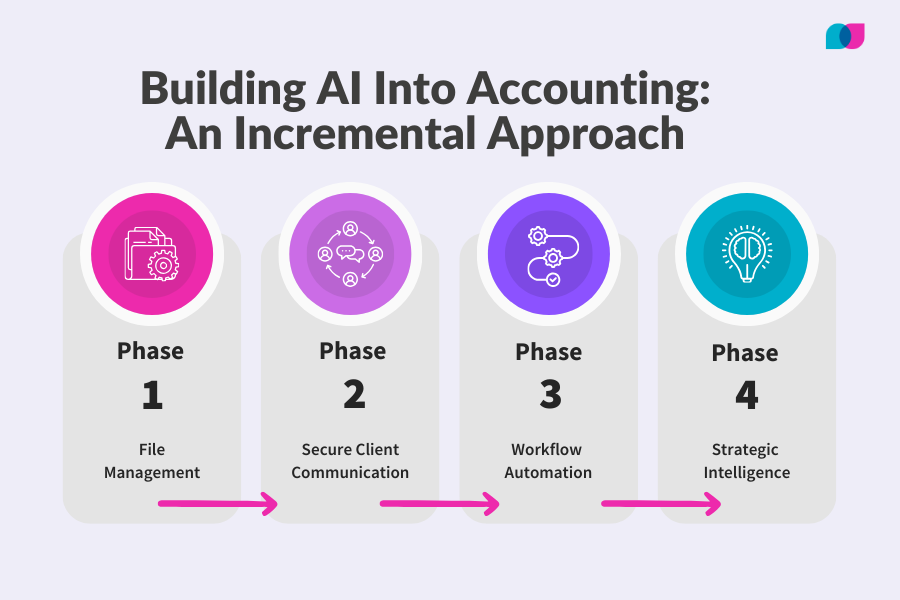AI for Public Accounting Firms: From Administrative Burden to Strategic Focus

How to start saving money
Lorem ipsum dolor sit amet, consectetur adipiscing elit lobortis arcu enim urna adipiscing praesent velit viverra sit semper lorem eu cursus vel hendrerit elementum morbi curabitur etiam nibh justo, lorem aliquet donec sed sit mi dignissim at ante massa mattis.
- Neque sodales ut etiam sit amet nisl purus non tellus orci ac auctor
- Adipiscing elit ut aliquam purus sit amet viverra suspendisse potent
- Mauris commodo quis imperdiet massa tincidunt nunc pulvinar
- Excepteur sint occaecat cupidatat non proident sunt in culpa qui officia
Why it is important to start saving
Vitae congue eu consequat ac felis placerat vestibulum lectus mauris ultrices cursus sit amet dictum sit amet justo donec enim diam porttitor lacus luctus accumsan tortor posuere praesent tristique magna sit amet purus gravida quis blandit turpis.

How much money should I save?
At risus viverra adipiscing at in tellus integer feugiat nisl pretium fusce id velit ut tortor sagittis orci a scelerisque purus semper eget at lectus urna duis convallis. porta nibh venenatis cras sed felis eget neque laoreet suspendisse interdum consectetur libero id faucibus nisl donec pretium vulputate sapien nec sagittis aliquam nunc lobortis mattis aliquam faucibus purus in.
- Neque sodales ut etiam sit amet nisl purus non tellus orci ac auctor
- Adipiscing elit ut aliquam purus sit amet viverra suspendisse potenti
- Mauris commodo quis imperdiet massa tincidunt nunc pulvinar
- Adipiscing elit ut aliquam purus sit amet viverra suspendisse potenti
What percentege of my income should go to savings?
Nisi quis eleifend quam adipiscing vitae aliquet bibendum enim facilisis gravida neque. Velit euismod in pellentesque massa placerat volutpat lacus laoreet non curabitur gravida odio aenean sed adipiscing diam donec adipiscing tristique risus. amet est placerat in egestas erat imperdiet sed euismod nisi.
“Nisi quis eleifend quam adipiscing vitae aliquet bibendum enim facilisis gravida neque velit euismod in pellentesque”
Do you have any comments? Share them with us on social media
Eget lorem dolor sed viverra ipsum nunc aliquet bibendum felis donec et odio pellentesque diam volutpat commodo sed egestas aliquam sem fringilla ut morbi tincidunt augue interdum velit euismod eu tincidunt tortor aliquam nulla facilisi aenean sed adipiscing diam donec adipiscing ut lectus arcu bibendum at varius vel pharetra nibh venenatis cras sed felis eget.
The Administrative Time Drain
Public accounting firms spend 40-60% of their time on administrative tasks. Document management, client communication, file organization, status updates — the very work that keeps the lights on is drowning teams in busywork.
Most accountants have experimented with AI tools like ChatGPT for research or drafting emails. But these foundational models create a dilemma: they're powerful, but they can't be trusted with confidential client information. The result? AI remains a side tool rather than a core workflow solution.
This is about to change. Private AI systems designed specifically for accounting workflows are emerging, and they're solving the trust problem while addressing the time drain that's crushing firm productivity.
Understanding AI: Public vs. Private Models
What Are Large Language Models (LLMs)?
Large Language Models are AI systems trained on vast amounts of text data to understand and generate human-like responses. Think of them as sophisticated pattern recognition engines that can process language, extract meaning, and produce relevant outputs.
The Public Model Problem
Public AI models like ChatGPT, Claude, or Gemini process your data on external servers. When you input client information, that data travels to third-party systems where it may be stored, analyzed, or used for model training. For accounting firms handling sensitive financial data, this creates unacceptable compliance and confidentiality risks.
Private LLMs: The Game Changer
Private LLMs operate within secure, trusted environments where your data already lives. Take Liscio's AI system — it processes your information within the same secure infrastructure that already houses your client communications and documents. Your data never leaves this trusted environment or gets used for training external models.
This distinction isn't academic — it's the difference between AI as an interesting experiment and AI as a core business tool.
The Trust Foundation: Security First
Before AI can transform accounting workflows, it must solve the trust equation. Liscio's private AI systems address this by operating within the same secure environment where your client data already lives — no new security risks, no additional compliance concerns.
- Data Containment: Your information never leaves the trusted system where it's already stored
- Proven Security: Leverages the same security protocols protecting your current client communications
- Seamless Integration: Works within your existing firm security and user management systems
With trust established, AI can move from the periphery to the center of daily operations.
Building AI Into Accounting: An Incremental Approach
The smartest firms aren't trying to transform everything at once. They're starting with high-impact, low-risk applications and building from there.

Phase 1: File Management Fundamentals
Start here because file management consumes enormous time while being relatively low-risk for AI intervention.
- Automated File Renaming Liscio's AI learns your firm's naming conventions and applies them instantly to incoming documents. No more manual renaming, no more inconsistent file names, no more searching through poorly labeled folders.
- Intelligent Filing AI analyzes document content and client context to suggest optimal filing locations in your Microsoft OneDrive or SharePoint environment. What used to require human judgment and firm knowledge now happens automatically.
- Natural Language Search Find any document, conversation, or piece of information using plain English queries. Instead of remembering exact file names or folder structures, simply ask "Show me the ABC Corp tax documents from last year" or "Find discussions about the Johnson audit deadline." AI understands context and intent, making information retrieval instantaneous.
Phase 2: Secure Client Communication
With file management optimized, expand to client-facing communications while maintaining security.
- Context-Aware Message Composition Liscio's AI drafts client emails using your firm's communication style and relevant client history. Since it operates within your existing secure environment, there's no data exposure risk.
- Account Summaries AI automatically summarizes client communication history by account and contact, allowing team members to instantly understand the current status of any client relationship. Whether you're jumping into a conversation mid-stream or taking over from a colleague, you get comprehensive context in seconds rather than scrolling through months of messages.
- Simple Client UI Clients get a 24/7 AI assistant that helps them find files, understand messages, and get answers instantly. Instead of calling or emailing with simple questions, clients can ask "Where's my tax return?" or "What documents do you still need?" and get immediate responses. This reduces interruptions to your team while improving client satisfaction.
Phase 3: Workflow Automation
Build on communication improvements to automate entire workflow sequences.
- Task Generation and Management AI converts client requests into structured tasks, assigns them based on team capacity and expertise, and tracks progress across multiple systems.
- Document Request Automation Based on client type and engagement scope, AI generates comprehensive document request lists and follows up on missing items automatically.
- Engagement Letter Intelligence AI drafts engagement letters incorporating client-specific details, fee structures, and scope modifications based on historical patterns and current requirements.
Phase 4: Strategic Intelligence
With operational efficiency established, AI begins providing analytical insights.
- Client Risk Analysis AI analyzes communication patterns, payment history, and engagement complexity to flag potential issues before they become problems.
- Capacity Planning Understand team workload, identify bottlenecks, and optimize resource allocation based on real workflow data rather than estimates.
- Revenue Optimization Identify opportunities for additional services, optimal pricing strategies, and client relationship improvements based on comprehensive data analysis.
The Compound Effect: From Burden to Breakthrough
Each phase builds on the previous one, creating compound improvements in efficiency and job satisfaction.
- Month 1-2: File Management Immediate time savings, reduced frustration, improved organization
- Month 3-4: Communication Optimization Faster client response times, fewer missed requests, more consistent service delivery
- Month 5-6: Workflow Automation Streamlined processes, reduced administrative overhead, improved task visibility
- Month 7+: Strategic Intelligence Data-driven decision making, proactive client management, strategic growth opportunities
Practical Benefits: From Time Drain to Time Gain
Firms using Liscio's AI systems report:
- 50-70% reduction in document management time
- 40% faster client communication cycles
- Dramatic improvement in staff satisfaction
- Increased capacity, less overtime, and higher job satisfaction
More importantly, teams report feeling in control rather than overwhelmed. The constant background stress of administrative burden lifts, replaced by confidence in systematic, intelligent workflows.
Implementation Strategy: Start Small, Think Big
The most successful firms don't follow a one-size-fits-all timeline. They create their own plan based on their specific needs and circumstances.
Some start with all clients immediately. Others begin with digital-only clients or specific practice areas. The approach matters less than the commitment to move forward with conviction.
What matters most: Choose your starting point, season your approach through experience, and execute your plan consistently. Success comes from building team confidence through incremental wins, not from waiting for perfect conditions.
The key is proving value incrementally while building team confidence in AI-powered workflows.
The Future Is Private, Practical, and Proven
The future of accounting is bright. AI is replacing the 40-60% of time that accountants spend on repetitive administrative work with time for real accounting, client relationships, and work-life balance.
Liscio's private AI operates within your existing trusted environment to make this transformation possible, reclaiming wasted hours and converting them into capacity for the strategic work that truly drives client value.
The firms that embrace this approach first will find themselves with a significant competitive advantage: teams that are less stressed, more productive, and focused on what matters most.
The technology is ready. The question is: are you ready to reclaim your time?
Ready to Start? Begin with File Management
See how private AI can transform your document workflows in 2 minutes.


